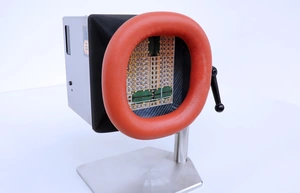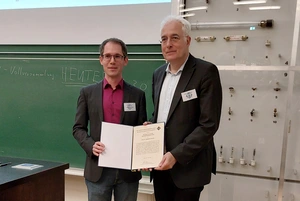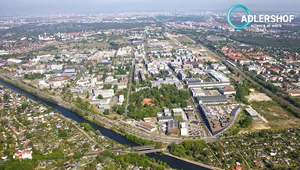News

New pioneering Leibniz Lab to combat pandemics
FBH contributes its expertise in the development of innovative UV light-emitting diodes and related irradiation systems:
The newly launched Leibniz Lab "Pandemic Preparedness: One Health, One Future" combines excellent interdisciplinary and transdisciplinary research from 41 Leibniz Institutes. For the first time in Germany,…

Sebastian Keckert wins Young Scientist Award for Accelerator Physics
The physicist developed new superconducting thin-film material systems at HZB that enable significant energy savings at accelerator facilities:
Dr Sebastian Keckert has been awarded the Young Scientist Award for Accelerator Physics of the German Physical Society (DPG). The prize is endowed with 5000 euros and was presented to him on 21.03. during the spring…

Novel system for terahertz power measurements
The 300 GHz detector, developed in a Franco-German cooperation project with PTB, enables secure communication at 6G frequencies:
Until now, it has not been possible to measure the radiated power of millimeter waves in the terahertz spectral range in the so-called H-band with frequencies from 220 GHz to 330 GHz traceable to the International…

Prof. Clara Saraceno is honored with the International Fellowship Award 2024
The IKZ researcher receives the award for achievements in the field of oxide and fluoride dielectrics and laser crystals:
Oxide and fluoride crystals are pivotal in many different areas of photonics. They are well-suited host materials for laser-active ions, can serve in optical Faraday insulators and also for non-linear frequency…

Berlin Adlershof: High technology, skilled employees and openness as key success factors
Germany's largest science and technology park remains an important pillar of Berlin's economy :
The Berlin Adlershof Science and Technology Park continued its positive development in 2023. Revenues and budget funds grew by a solid 7.1% to € 3.9 billion (2022: € 3.6 billion). The number of employees remained…

Berlin Adlershof: Facts and figures
Berlin Adlershof is Germany’s largest and most successful science and technology park as well as Berlin’s largest media location – embedded in an overall urban development concept. Spanning an area of 4.6 km², the…

SKM Dissertation Prize 2024 of the DPG for Lisa-Marie Kern
The physicist has been awarded the Dissertation Prize of the Condensed Matter Section of the German Physical Society:
In recognition of her outstanding scientific work and its excellent presentation, Dr. Lisa-Marie Kern has been awarded the Dissertation Prize of the Condensed Matter Section (SKM) of the German Physical Society…

IKZ researcher Ta-Shun Chou receives DGKK Young Scientist Award and wins INAM startup competition
The young scientist was honored for his outstanding scientific achievements in the field of crystal growth:
This year, the German Association of Crystal Growth (Deutsche Gesellschaft für Kristallzüchtung und Kristallwachstum, DGKK) honors IKZ postdoctoral researcher Dr. Ta-Shun Chou with the Young Scientist Award for his…

Kathrin Goldammer elected board member of Women in Green Hydrogen
RLI Managing Director supports the association in political matters:
RLI Managing Director Kathrin Goldammer has been a board member of Women in Green Hydrogen (WiGH) since February 16th 2024. At an annual meeting in Berlin, the association members elected their first board of…

Valuable breaks
Rico Regner runs the green canteen in Adlershof:
If Rico Regner hadn't listened to his mother's advice, things might have turned out very differently. “Why don't you find out what you actually want to do first,” she said. And so, the then-18-year-old from Berlin…

Where quantum computers can score
A Berlin research team has shown that a certain class of optimisation problems can actually be solved better with quantum computers than with conventional methods:
The travelling salesman problem is considered a prime example of a combinatorial optimisation problem. Now a Berlin team led by theoretical physicist Prof. Dr. Jens Eisert of Freie Universität Berlin and HZB has shown…

Humans and machines are moderately original
HU psychologist Jennifer Haase investigates the creativity of humans and AI systems:
Hereditary genius and sensitive nerves—or is this just a training effect? For more than 15 years, Jennifer Haase’s mind has been occupied with the question of what creativity is and how it can be fostered. She is…

Optical Frequency Combs Make Ultraviolet Spectroscopy More Sensitive and More Precise
New technique enables experiments in the ultraviolet spectral region at very feeble light levels:
In a recent publication in Nature, researchers at the Max Born Institute (MBI) in Berlin, Germany, and at Max-Planck Institute of Quantum Optics in Garching report on a new technique for deciphering the properties of…

Nathalie Picqué is the new Director at the Max Born Institute for Nonlinear Optics and Short Pulse Spectroscopy
The physicist will establish the Department of Precision Physics at the institute:
Professor Dr. Nathalie Picqué is establishing a new department as Director at the Max Born Institute for Nonlinear Optics and Short Pulse Spectroscopy (MBI) in Berlin, Germany. Her appointment at the end of 2023 is…

Searching for new materials
How simulations and machine learning are helping BAM to do so:
Using simulation and machine learning, Janine George is on the hunt for more efficient materials to advance the transition to clean energy, or Energiewende. Apart from saving her a lot of time, it helps her find new…

IKZ Accelerates Efforts for Energy Efficiency with Advanced Power Conversion Technology
Further development of gallium oxide technology promotes optimisation in high-power and high-voltage applications:
The need for advanced power conversion systems increases as the EU ambitiously pursues net zero emissions. To achieve this, it is necessary to optimize the energy transfer from the grid to daily use and to minimize…

Ultrafast switching with light in correlated materials
Research team manipulates the material’s resistivity with light – a way for opto-electronic ultrafast switching in future microelectronics:
Materials that refuse to fit into theory are often the most fascinating. They challenge researchers to try harder to understand their peculiar behavior, especially when their properties are promising for technological…

ERC Consolidator Grant for HZB researcher Robert Seidel
The project is investigating nanoparticles that are used as catalysts in the production of "green" hydrogen:
Physicist Dr Robert Seidel has been awarded a Consolidator Grant by the European Research Council (ERC). Over the next five years, he will receive a total of two million euros for his research project WATER-X. Seidel…
Stronger than Nature: Optimised Radicals as Potential Novel Catalysts
Research team redesigns phenoxyl radicals with improved oxidation capacity in the lab:
Nature uses enzymes for various metabolic processes. These biological catalysts are extremely efficient. Biomimetic catalysts based on inexpensive starting materials from the laboratory that can reproduce the…

KURO – A new start-up is breathing life into the construction industry
At the Adlershof Founder’s Lab, the team is developing software designed to make calculations much easier:
A start-up based at Adlershof Technology Park is working to bring about a revolution in the construction industry. Utilising artificial intelligence, the audacious founders are looking to fundamentally change the way…